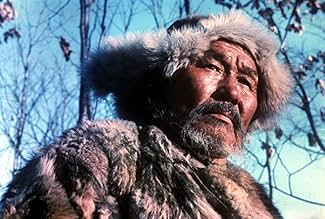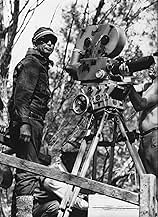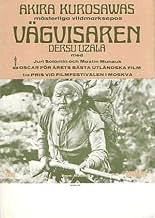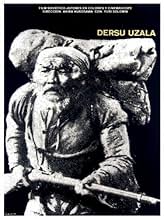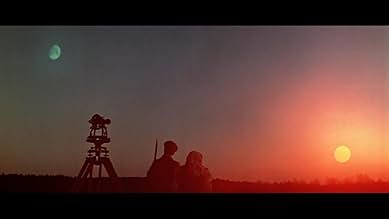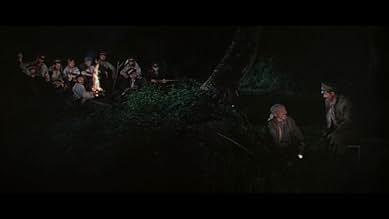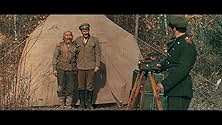IMDb RATING
8.2/10
35K
YOUR RATING
The Russian army sends an explorer on an expedition to the snowy Siberian wilderness where he makes friends with a seasoned local hunter.The Russian army sends an explorer on an expedition to the snowy Siberian wilderness where he makes friends with a seasoned local hunter.The Russian army sends an explorer on an expedition to the snowy Siberian wilderness where he makes friends with a seasoned local hunter.
- Director
- Writers
- Stars
- Won 1 Oscar
- 8 wins & 1 nomination total
Mikhail Bychkov
- Otryad Arseneva
- (as M. Bychkov)
Vladimir Khrulyov
- Otryad Arseneva
- (as V. Khrulyov)
Stanislav Marin
- Otryad Arseneva
- (as S. Marin)
Igor Sykhra
- Otryad Arseneva
- (as I. Sykhra)
Vladimir Sergiyakov
- Otryad Arseneva
- (as V. Sergiyakov)
Yanis Yakobsons
- Otryad Arseneva
- (as Ya. Yakobsons)
Vladimir Khlestov
- Otryad Arseneva
- (as V. Khlestov)
Vladimir Sverba
- Otryad Arseneva
- (as V. Sverba)
Vladimir Kremena
- Turtygin
- (as V. Kremena)
Aleksandr Pyatkov
- Olenev
- (as A. Pyatkov)
- Director
- Writers
- All cast & crew
- Production, box office & more at IMDbPro
Featured reviews
On the face of it, Dersu Uzala would not seem like a candidate for a great film. The story is about a young Russian (Imperial Russia) officer is sent to the far east of Siberia to explore. He meets with a native of the region and they form a bond together. The territory in question is the wild, rugged eastern Siberia (north of Valdivostok). I would say that you have not lived until you have seen what Kurosawa can do filming nature in its raw splendor and magnificence. The scenes in this film like the wind rushing through the tall reeds, or the mist draping the forested hills, are images of haunting beauty.
Kurosawa, one of the greatest film directors of the 20th century, made his final masterpiece with film. The characters are well drawn, the sub-text of the story (the clash of civilization vs. nature) is nuanced, but most of all it is the wild beauty of nature which is the focus of this film. Once you see it, I don't think you will forget it, I know I never have.
Kurosawa, one of the greatest film directors of the 20th century, made his final masterpiece with film. The characters are well drawn, the sub-text of the story (the clash of civilization vs. nature) is nuanced, but most of all it is the wild beauty of nature which is the focus of this film. Once you see it, I don't think you will forget it, I know I never have.
This 1975 joint Japanese-Russian film is a celebration of simple virtues, friendship, loyalty, love, and respect for nature. Based on the journals of the Tsarist explorer and surveyor, Captain Vladimir Arseniev, it is the story of the relationship between Captain Arseniev and an Asiatic hunter of the Goldi tribe named Dersu Uzala. With a love and understanding of the forest that is extraordinary, Dersu guides the Captain through several deadly encounters. He saves the Captain's life by building a shelter out of reeds during a ferocious wind storm. Maksim's performance as Dersu, the ancient woodsman, is very "Yoda-like": wonderous, dignified, and very natural.
The friendship between the two main characters grows over many years and several expeditions in the wild. Their relationship is beautifully developed and moves to an inevitable climax when Dersu and the Captain move back to the Captain's home in the city.
There is in this film a sense of the beauty, tranquility, and timelessness of nature. It takes place at a time in the early part of the last century when people had closer ties with nature and felt a kinship with animals, plants, and the elements. Dersu endearingly refers to all elements of nature including the river, the wind, the trees, and the animals as "men". As the English writer, Hugh Trevor-Roper said of Shakespeare so it is true of Dersu, "He sees mankind almost as part of nature, sometimes basking in a delightful, smiling Nature; sometimes caught up in a fierce, cruel, inexorable, insatiable Nature".
I was totally absorbed in this film and in its regard for the essential goodness of man and the beauty of the natural world. Dersu Uzala is a great film from one of the all-time masters.
The friendship between the two main characters grows over many years and several expeditions in the wild. Their relationship is beautifully developed and moves to an inevitable climax when Dersu and the Captain move back to the Captain's home in the city.
There is in this film a sense of the beauty, tranquility, and timelessness of nature. It takes place at a time in the early part of the last century when people had closer ties with nature and felt a kinship with animals, plants, and the elements. Dersu endearingly refers to all elements of nature including the river, the wind, the trees, and the animals as "men". As the English writer, Hugh Trevor-Roper said of Shakespeare so it is true of Dersu, "He sees mankind almost as part of nature, sometimes basking in a delightful, smiling Nature; sometimes caught up in a fierce, cruel, inexorable, insatiable Nature".
I was totally absorbed in this film and in its regard for the essential goodness of man and the beauty of the natural world. Dersu Uzala is a great film from one of the all-time masters.
It's 1902. Russian army explorer Captain Arseniev leads an expedition into the Siberian wilderness. They encounter local native hunter Dersu Uzala and recruit him as their guide.
It's a Soviet film made by the legendary Japanese filmmaker Akira Kurosawa. I'm not sure how that happened. Quite frankly, I watched the first hour without knowing about Kurosawa and was going to write that this is the best filmmaking out of the Soviet Union. The movie is over two hours and it does need to find a road map for their journey. I'm not saying that it lacks direction. It has an emotional direction. It's about the two men's relationship. I would like for more scenes of the two of them alone. They should have more heart to heart dialogue. Dersu is a great character. For example, I love the grass shelter and the two men are alone in survival mode. I'm also surprised by the tiger. The second half holds some interesting surprises. This is an interesting page in a legend's work. It won an Oscar.
It's a Soviet film made by the legendary Japanese filmmaker Akira Kurosawa. I'm not sure how that happened. Quite frankly, I watched the first hour without knowing about Kurosawa and was going to write that this is the best filmmaking out of the Soviet Union. The movie is over two hours and it does need to find a road map for their journey. I'm not saying that it lacks direction. It has an emotional direction. It's about the two men's relationship. I would like for more scenes of the two of them alone. They should have more heart to heart dialogue. Dersu is a great character. For example, I love the grass shelter and the two men are alone in survival mode. I'm also surprised by the tiger. The second half holds some interesting surprises. This is an interesting page in a legend's work. It won an Oscar.
10hartj-1
A wonderful film. It showcases the natural beauty of the Taiga and presents a contrast between the technological and the pastoral. Dersu is one with the forest. He knows its ways and its moods. The Russians scoff at his ways and his 'primitive' belief system, but eventually come to rely on him, and even love him. It is a beautiful story that takes place in an world that very few of us in the West have had a chance to see. I thought the fact that the film was set in the pre-revolutionary period gave it a peculiar sort of charm - Russia before the Great War and the Russian Revolution was innocent and even naive, the same way the Russian soldiers were innocent of the wonders and the dangers of the Taiga. One of the things I loved most about this film was the cinematography - there are long, lingering shots of the landscape, the endless steppe, the forest, the rivers, the mountains. We believe ourselves to be powerful because we have been moderately successful in our attempts to harness nature for our own uses, but the film shows us that we are deluding ourselves, that nature cannot be controlled or resisted, and the truly powerful are those, like Dersu, who co-exist in harmony with nature and learn what the wilderness teaches.
Akira Kurosawa was a masterful director and powerful storyteller, Dersu has always been my favourite of his films. It was also the first I saw - on Christmas Day afternoon 1978 on UK BBC2 - would that they were as adventurous nowadays! Since then of course I've seen all of his films from Stray Dog on, Rashomon and Ran being especial favourites, but I keep on coming back to watch this one, ostensibly the simplest tale Kurosawa ever filmed.
The understanding and bonding that develops between the two men Arseniev and Dersu is wonderful to see, and over two hours holds your attention with expertly observed minutiae of character and scenic interplay. The last ten minutes cover a lot of ground (no pun intended) but it's all so logical and sad that I always need to see the end credits to recover.
So many marvellous scenes: the tiger in the forest in the morning; the phlegmatic reclusive old Chinaman; the raft; wispy blue shaded smoke from night-fires; the conclusion of course; the view of those two great men, the Moon and the Sun in the same shot. Not everyone would like Dersu, their most likely comments being "boring" - but how wrong they are they'll never know!
A film not fit to lick Dersu Uzala's metaphorical boots (or even Plan 9 from Outer Space's for that matter), Blazing Saddles was filmed the same year in America and a generation on still gets more praise than this poetic masterpiece!
The understanding and bonding that develops between the two men Arseniev and Dersu is wonderful to see, and over two hours holds your attention with expertly observed minutiae of character and scenic interplay. The last ten minutes cover a lot of ground (no pun intended) but it's all so logical and sad that I always need to see the end credits to recover.
So many marvellous scenes: the tiger in the forest in the morning; the phlegmatic reclusive old Chinaman; the raft; wispy blue shaded smoke from night-fires; the conclusion of course; the view of those two great men, the Moon and the Sun in the same shot. Not everyone would like Dersu, their most likely comments being "boring" - but how wrong they are they'll never know!
A film not fit to lick Dersu Uzala's metaphorical boots (or even Plan 9 from Outer Space's for that matter), Blazing Saddles was filmed the same year in America and a generation on still gets more praise than this poetic masterpiece!
Did you know
- TriviaAkira Kurosawa had hoped to make this film as early as in the 1950s, but he had trouble adapting the story to a Japanese setting, never thinking that one day he would actually be able to film it on location in Russia, and with Russian actors.
- GoofsWhen Dersu and Arsenev are looking at the 3/4 moon and the setting sun, the moon is in the wrong phase to appear in the sky at the same time as the sun.
- Quotes
Dersu Uzala: How can people live in a box?
- ConnectionsFeatured in For the Love of Movies: The Story of American Film Criticism (2009)
- How long is Dersu Uzala?Powered by Alexa
- Is this a real story?
Details
- Release date
- Countries of origin
- Official site
- Languages
- Also known as
- L'aigle de la Taiga
- Filming locations
- Production companies
- See more company credits at IMDbPro
Box office
- Budget
- $4,000,000 (estimated)
- Gross worldwide
- $14,480
- Runtime2 hours 22 minutes
- Color
- Aspect ratio
- 2.20 : 1
Contribute to this page
Suggest an edit or add missing content



